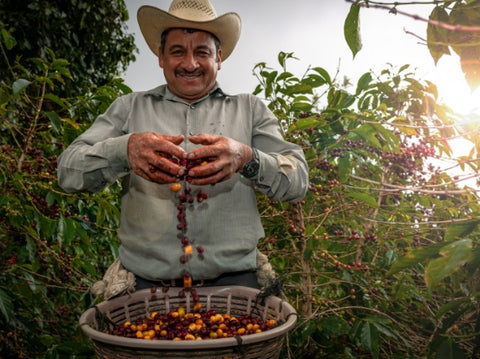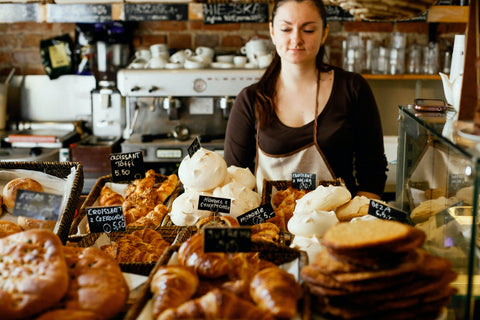It’s no wonder people are constantly confused about what coffee to buy.
CBD coffee. Vegan coffee. Mushroom coffee. And now, gluten-free coffee.
With so many different coffee options on the market, coffee brands have to find a way to stand out from the rest of the bags on the shelf. Sadly, many companies opt to use deceptive marketing tactics like labeling coffee as “gluten-free” to attract customers.
Let us be the ones to shout it from the rooftops for you:
Gluten-free coffee is a scam!
Those who suffer from Celiac disease or gluten sensitivity know how serious these conditions are. And, finding truly gluten-free products can be a challenge. Marketing coffee as gluten-free only makes it more confusing for consumers.
That’s why we’re going to show you:
- Why specialty coffee is always gluten-free
- How to identify gluten-free creamers and milk (yes, gluten can be in your creamer!)
- 3 times when you should be concerned about gluten in coffee
And as a bonus, we’ll show you how to brew delicious (and naturally, 100% gluten-free) coffee at home.
What Does Gluten-Free Really Mean?
Before we dive into why coffee is already safe for those avoiding gluten, let’s define what “gluten-free” means.
Gluten is a protein found in grains such as wheat, barley, and rye. These ingredients are used in foods such as pasta and bread along with dressings, thickening agents, flavoring, and coloring.
When someone is diagnosed with Celiac disease, this means that ingesting gluten can cause immune system activity that damages the small intestine. People can also be diagnosed with gluten sensitivity. This condition also causes a myriad of gastrointestinal, autoimmune, and other problems.
It’s easy to see why people diagnosed with these conditions are careful about what they consume. But when you want to start your day with a mug full of freshly brewed specialty coffee, you don’t have to worry about it containing gluten.
Spoiler Alert: Coffee Is Naturally Gluten-Free
When you buy coffee beans from a roaster, you’re getting exactly that: coffee beans.
No secret ingredients. No additives. Just coffee beans.
This means that all specialty coffee is gluten-free coffee.
There’s no need to classify one specialty coffee as gluten-free over another because neither coffee contains gluten.
The journey to your morning cup of caffeine starts with a coffee plant. This plant produces coffee cherries that are processed, dried, and shipped off to roasters as green coffee. The green coffee then goes through the roasting process, which brings out the bean’s natural flavors. The roasted coffee then packaged and sold to customers and coffee shops.

From start to finish, there’s not a single ounce of gluten in a coffee bean.
So, can people who follow a strict gluten-free diet drink coffee? Absolutely!
But, there’s a slight caveat…
What you put in your coffee may contain gluten.
How To Identify Gluten-Free Creamers And Milk
Black coffee is always gluten-free. After all, it’s just a seed that was ground up and doused with hot water—no extra ingredients to worry about
But, even though specialty coffee boasts a spectrum of natural flavors like caramel, red apple, and almonds, many coffee drinkers like to add creamer or milk to their cup.
Before you pour anything extra into your coffee, always read the label.
Traditional whole, skim, 1%, and 2% milk is naturally gluten-free. Most alternative milk, such as almond and soy milk, are safe as well. But certain creamers or alternative milk, especially those that are flavored, may have ingredients that contain gluten.
Flavored alternative milk and creamers can also contain ingredients such as malt, wheat flour, spelt, or barley. These ingredients are commonly used to thicken the beverage. Even if the milk or creamer is labeled gluten-free, certain “added flavors” ingredients can contain gluten.
Be Very Careful with Oat Milk!
Oat milk is the latest alternative milk to take the coffee scene by storm. From creamy lattes to a tasty splash in your coffee, oat milk is delicious and a great option for coffee drinkers looking to avoid dairy products.
But for those with Celiac disease or a sensitivity to gluten, oat milk can be a nightmare.

Oat milk can be made with all types of oats. Pure, unprocessed oats do not contain gluten, while rye or barley do. While many oat milk brands use unprocessed oats and are labeled as gluten-free, there's always a chance the beverage was processed at a facility that uses grains containing gluten.
So, if you want to try oat milk in your coffee, read the label first.
Fortunately, making gluten-free oat milk at home is super easy!
3 Times to Be Concerned About Gluten & Coffee
Yes, coffee is naturally gluten-free. And, coffee beans marketed as “Gluten-Free Coffee” are a scam.
But, if you experience extreme reactions to gluten, there are three times when you should be concerned about your coffee.
Artificially Flavored Coffee
We’ve explained why buying artificially flavored coffee is a bad idea before. Although flavored coffees may sound tasty and are labeled as gluten-free, they can still cause reactions for individuals with Celiac disease and gluten intolerance.
The flavoring used in coffee contains an alcohol base. This alcohol base is often created from grains that contain gluten. While the distillation process removes much of the gluten proteins from the alcohol, trace amounts will remain.
Since the FDA states that foods and beverages labeled as “gluten-free” must contain less than 20 parts per million (ppm) of gluten, food and drinks such as flavored coffee can still contain minuscule amounts of gluten.
If you’ve had reactions to gluten, even in extremely small amounts, steer clear of flavored coffee. (Besides, you should do this anyway!)
Cross-Contamination Inside Coffee Shops
While certain foods and coffee are naturally gluten-free, the chance for cross-contamination is always possible. This happens when the same equipment is used to cook gluten-free food and food containing gluten such as bread and pasta.
In a specialty coffee shop, there’s a super small chance of this happening to your morning coffee order. Specialty coffee roasters and shops do not store their coffee beans or milk near the pastries and food ingredients, meaning cross-contamination in your drink would be extremely rare.

It’s more important to be worried about the food inside a coffee shop rather than the coffee. Ask the barista if the shop follows any Celiac-friendly protocols such as separate waffle irons or sinks for dishes.
If you react severely to gluten, consider perfecting your home barista skills and making cafe-quality coffee at home. We’ll show you how in just a bit!
Coffee Syrups
Remember, black coffee is completely gluten-free and naturally flavorful when sourced and roasted right.
When you start adding extra ingredients—you know, the ones that turn your morning java jolt into dessert—that’s when the gluten considerations begin.
On top of adding gluten-filled cookie crumbles and cake bites to over the top frozen coffee drinks, flavor syrups are a major concern for those following a gluten-free diet.
Torani Syrups, a staple in coffee shops across the world, sells several syrups containing gluten. The next time you want a caramel latte, ask to read the syrup’s label first.
The Truth About “Gluten-Free Coffee” and Your Health
If you follow a gluten-free diet, you’re acutely aware of your wellbeing and seek out the tastiest, but healthy, food options. Kudos!
That’s why we want you to only drink the best coffee available! And, coffee labeled as “gluten-free” isn’t it.
Low-grade coffee, whether marketed as a gluten-free brand or smothered in flavoring to hide defects, can be harmful to your health. More often than not, low-quality coffee is grown using abrasive chemicals, which can end up in your cup, destroying the inherent flavors of your coffee.
If you want to drink the best quality coffee that’s completely safe for a gluten-free diet, specialty coffee is the way to go.
And, there’s a reason specialty coffee is far better than any “gluten-free” coffee on the market. From the farm to your cup, every aspect of your coffee is created with care and attention-to-detail.
Be a Home Barista with JavaPresse
If you’re concerned about the cross-contamination of gluten in your coffee, the best place to brew is at home. After all, home brewing is so much fun!
You’ll find everything you need to be a home barista in our Javapedia. From brew recipes to the answers to all of your coffee questions, think of our Javapedia as your personal coffee assistant.


